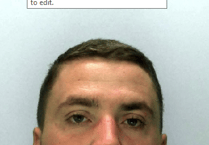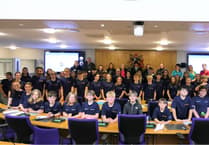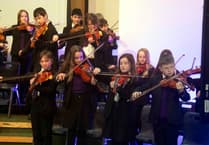FOREST MP Mark Harper has been banned from entering Russia by Vladimir Putin’s government.
He is one of nearly 300 MPs and former members of the House of Commons accused of “whipping up Russophobic hysteria” to be barred from Russian Federation soil.
PM Boris Johnson told the House of Commons last Wednesday the banned politicians should wear the sanctions as a “badge of honour”.
Monmouth MP David Davies and South Herefordshire MP Jesse Norman have also been barred, alongside North Herefordshire MP Bill Wiggin, who lives near Ross-on-Wye.
The Russian foreign ministry said it was taking action against the 287 politicians from both sides of the House in response to sanctions against Russian politicians, although its list contains 10 former MPs, with those targeted presumably culled from an out-of-date pre-2019 election list.
Foreign Minister Sergei Lavrov’s department announced the move in response to the UK sanctioning 386 members of the Duma, the lower house of the Russian parliament, last month.
Forest of Dean Tory MP Mr Harper, who was chief whip under David Cameron, tweeted: “Proud to be on this list with many of my colleagues in the House of Commons.
“Russia really hates being called out for their illegal invasion of Ukraine and disgraceful war crimes.
“The United Kingdom stands with Ukraine.”
Monmouth Conservative MP Mr Davies, who has a Hungarian wife, said: “I am proud to be a part of the UK Government which has led the world in providing weapons and training to the Ukrainian Government, organising sanctions against Russia, sending our armed forces to NATO bases in the region and supporting refugees.
“The UK Government will continue to stand with Ukraine,”
And he posted on Saturday: “We stand alongside our partners in promoting peace and security across Europe and deterring Russian aggression.
“That’s why 8,000 British troops will deploy in planned exercises across Europe this summer with our NATO allies.”
A translation of the Russian foreign ministry statement said the sanctions were being applied “on the basis of reciprocity”.
It added: “These persons, who are no longer allowed to enter the Russian Federation, took the most active part in the establishment of anti-Russian sanctions instruments in London, and contribute to the groundless whipping up of Russophobic hysteria in the UK.
“The hostile rhetoric and far-fetched accusations coming from the mouths of British parliamentarians not only condone the hostile course of London, aimed at demonising our country and its international isolation, but are also used by opponents of mutually respectful dialogue with Russia to undermine the foundation of bilateral co-operation.”




